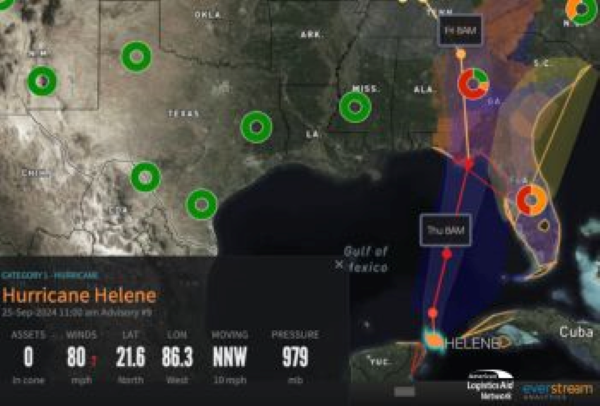ALAN Calls On Industry Businesses To Prepare for Hurricane Helene
As Hurricane Helene intensifies and approaches landfall along the Florida Gulf coast, the American Logistics Aid Network (ALAN) is encouraging all its partners to prepare.
 “As always, all of us at ALAN are hoping that this storm will be much less severe than predicted and that any damage to life, health and property will be minimal,” said Kathy Fulton, ALAN executive director. “At the same time, we are grateful for the many good people like you who continue to invest in our work.”
“As always, all of us at ALAN are hoping that this storm will be much less severe than predicted and that any damage to life, health and property will be minimal,” said Kathy Fulton, ALAN executive director. “At the same time, we are grateful for the many good people like you who continue to invest in our work.”
With that in mind, she offered five pre-storm takeaways that ALAN officials believe are essential for organizations to be aware of. They are:
1. Make personal safety a priority.
If you or your locations are located anywhere near Helene’s path, be sure to monitor the National Hurricane Center and your local National Weather Service forecast for real-time details. Please, do not ignore any safety warnings that pertain to you or your personnel. This is expected to be a major hurricane with winds of up to 115 miles per hour, which means its potential impact is not to be taken lightly.
2. Get the latest detailed information about storm-related road closures, facility closures and other supply chain impacts by visiting ALAN’s Supply Chain Intelligence Center at https://www.alanaid.org/map/.
It should tell you most of what you need to know. But should you need additional information, please contact us at https://www.alanaid.org/contact/. Time permitting, we will do our best to work with our emergency partners to get you an answer.
3. View the latest requests for logistics support by going to the “Active Logistics Needs” section of our Disaster Micro-Site at https://www.alanaid.org/operations/.
Over the past few weeks, ALAN has been communicating with various emergency management and non-profit partners regarding hurricane needs for Beryl, Debby, and Francine – and has already begun receiving requests for pre-positioning of relief materials for Hurricane Helene. Although there are no “open” requests for Hurricane Helene posted on its Disaster Micro-Site now, the situation could quickly change as the storm makes landfall. In fact, in previous years, most requests have come several days or weeks after hurricanes have hit. So, stay tuned and stay ready – because as requests for transportation, warehousing, volunteers and material handling equipment come in, ALAN will be posting them promptly.
4. Request or offer support. If you are a non-profit, tell us what you anticipate needing by making a request at (alanaid.org/request-support). If you are a business, tell us how you can help by making a “pre-offer” for transportation, warehouse space, equipment, expertise or services at https://www.alanaid.org/how-to-help/.
We find such information to be hugely helpful because it helps us better plan our response. Knowing what is needed and who can help allows us to move quickly to support the most urgent needs. We’ll confirm all the information with you and match offers with needs that fit.
5. Be mindful and demure in how you support disaster relief activities. Don’t self-deploy to disaster-affected sites, and please don’t participate in product collection drives.
Although the intention behind both activities is good, they often create more challenges than they solve, because they tend to get in the way of responders who are working to save lives – and add confusion to an emergency supply chain that is already under tremendous strain. If you’re looking for a meaningful way to help, consider making a financial contribution to ALAN or a humanitarian organization of your choice. Such donations will be much more useful and efficient – and far more likely to reach storm survivors.
In addition, ALAN’s Disaster Micro-Site will share key details about ALAN’s storm activation measures, current situation reports, and how businesses can support relief efforts.
“Because this has the potential to be an especially destructive storm, we encourage you to visit ALAN’s Supply Chain Intelligence Center, where you’ll find resources to keep you in the loop about everything from Helene’s latest path to how local and regional transportation infrastructure is being affected,” Fulton said.


















